Daily self-reflection is a powerful practice for personal growth and mental well-being. It involves taking a step back to examine your thoughts, emotions, and behaviors.
By dedicating time each day to reflect, individuals can enhance their self-awareness, improve their emotional intelligence, boost their mental health, foster personal growth, and cultivate empathy and compassion.
This article will explore these benefits and provide insights into how daily self-reflection can lead to a more fulfilling life.
Understanding Self-Reflection

Self-reflection examines one’s thoughts, feelings, and behaviors to gain deeper insight and understanding. This practice has been a cornerstone of many philosophical traditions, particularly Stoicism.
The Stoics, including prominent figures like Marcus Aurelius, Epictetus, and Seneca, often emphasized the importance of introspection.
In his “Meditations,” Marcus Aurelius regularly documented his thoughts and reflections, providing a profound example of this practice.
In modern times, self-reflection remains relevant as a tool for personal development.
It helps individuals understand their motivations, recognize patterns in their behavior, and make conscious choices that align with their values and goals.
By incorporating self-reflection into daily life, one can navigate the complexities of the modern world with greater clarity and purpose.
Benefits of Daily Self-Reflection
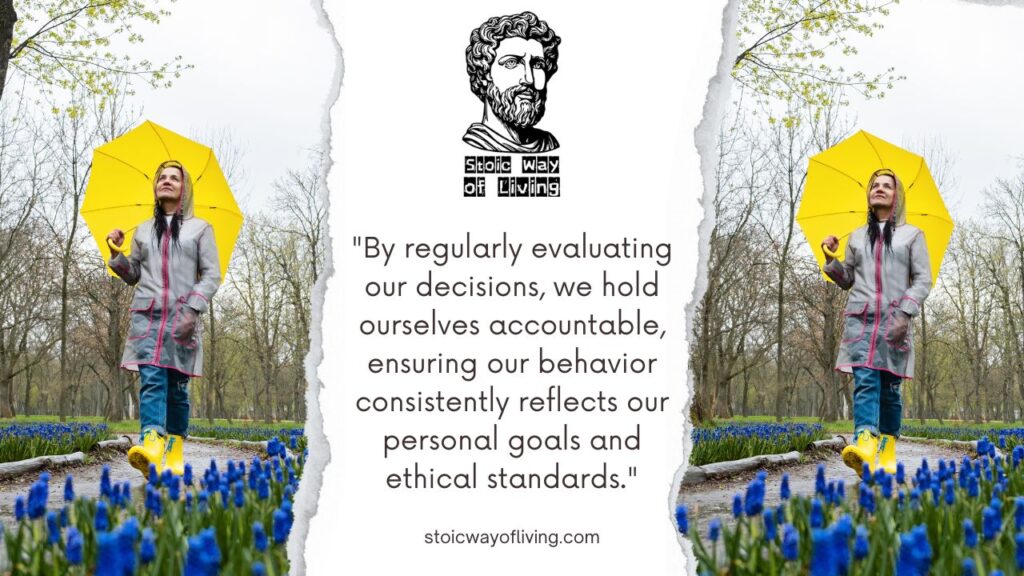
Greater Accountability
Daily self-reflection fosters greater accountability by encouraging individuals to regularly evaluate their actions and decisions.
According to Stoic teachings, personal responsibility is crucial for moral development.
By reflecting on daily experiences, one can recognize areas where one may have fallen short and identify opportunities for improvement.
This process helps set and adhere to personal goals, ensuring that one’s actions align with one’s values.
Regular introspection allows individuals to develop a stronger sense of accountability to themselves and others, leading to more responsible and ethical behavior.
Enhanced Emotional Resilience
One of the core benefits of self-reflection is enhanced emotional resilience.
By regularly examining their emotional responses, individuals can better understand their triggers and learn to manage their emotions more effectively.
Stoicism teaches that while we cannot control external events, we can control our reactions.
Through daily reflection, one can practice this principle, learning to maintain equanimity in facing challenges.
This emotional resilience enables individuals to navigate life’s ups and downs with excellent stability and composure, ultimately leading to a more balanced and fulfilling life.
Improved Decision Making

Reflecting on past decisions can significantly enhance future decision-making abilities.
The Stoic practice of Prosoche (attention) involves being mindful and present in one’s actions and thoughts.
By incorporating this practice into daily self-reflection, individuals can critically assess their previous choices, understand their reasoning, and learn from mistakes.
This continuous learning and adaptation process leads to more informed and rational decision-making.
Over time, this can result in more effective strategies for achieving personal and professional goals and a greater sense of confidence in one’s ability to make sound decisions.
Cultivation of Virtue
The cultivation of virtue is at the heart of Stoic philosophy.
Individuals can consistently evaluate their actions against the Stoic virtues of wisdom, courage, justice, and temperance by daily self-reflection.
This regular assessment encourages continuous moral and ethical improvement.
Stories from Stoic philosophers, such as Marcus Aurelius’s reflections in “Meditations,” illustrate how daily introspection can lead to a more virtuous life.
Individuals can develop solid moral character and live according to their highest principles by embodying these virtues through reflection.
Alignment with Core Values
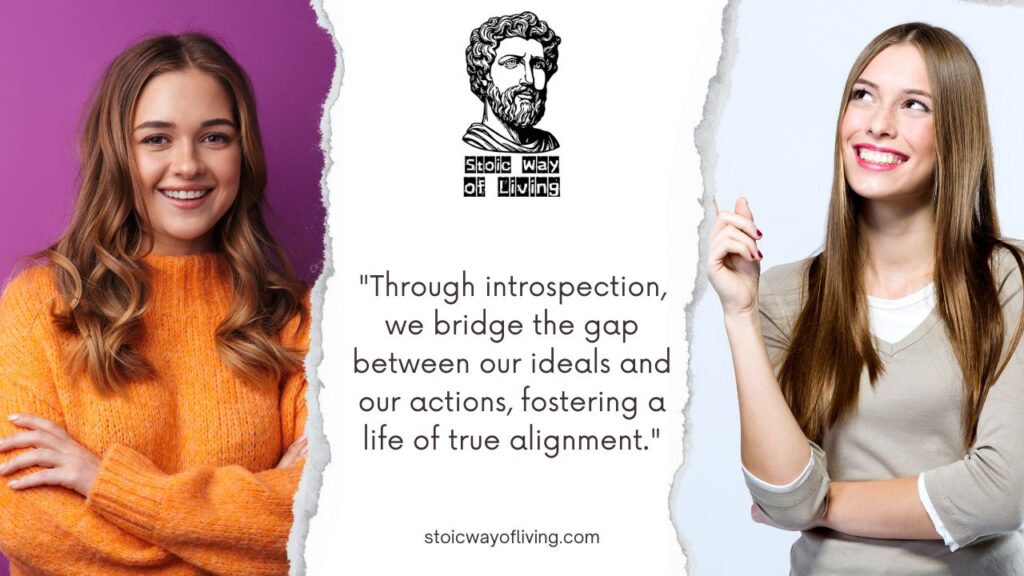
Self-reflection helps individuals ensure their actions align with their core values.
Stoicism teaches that following one’s values is essential for a meaningful life.
Through daily introspection, one can identify discrepancies between one’s actions and values and make necessary adjustments.
This alignment fosters a sense of integrity and authenticity, allowing individuals to live more congruently with their true selves.
By regularly reflecting on their values and how they manifest daily, individuals can maintain a clear sense of purpose and direction.
Enhanced Self-Awareness and Personal Growth
Daily self-reflection significantly enhances self-awareness, providing a deeper understanding of one’s thoughts, emotions, and behaviors.
This heightened self-awareness is crucial for personal growth, allowing individuals to recognize and address their strengths and weaknesses.
By consistently reflecting on their experiences, individuals can identify patterns and tendencies that may hold them back, facilitating continuous self-improvement.
Stoic teachings emphasize the importance of knowing oneself to achieve a virtuous life.
Enhanced self-awareness through reflection empowers individuals to make conscious choices that align with their goals, leading to sustained personal and professional development.
Practical Steps for Daily Self-Reflection
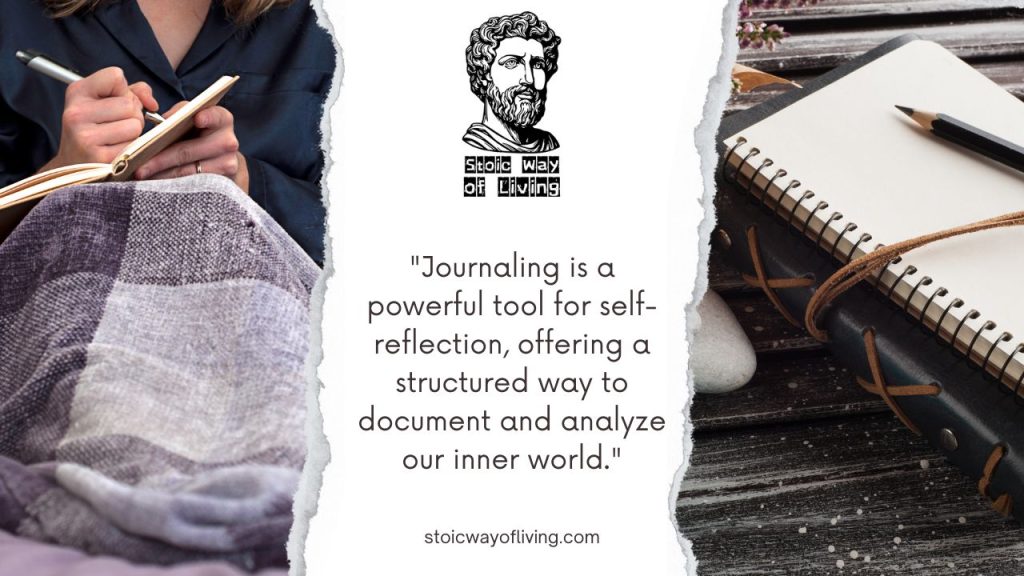
Journaling
Journaling is a powerful tool for self-reflection, offering a structured way to document thoughts and experiences.
Stoic philosophers like Marcus Aurelius used journaling to reflect on their daily lives.
To practice Stoic journaling, one can begin by noting daily events, emotions, and reactions.
Prompts inspired by Stoic teachings, such as “What did I do well today?” and “What could I have done better?” can guide this practice.
Over time, journaling can reveal patterns in behavior and thought, providing valuable insights for personal growth.
Evening Reflection
Reviewing the day before bed, as advocated by the Stoics, is a simple yet effective method of self-reflection.
Marcus Aurelius often reflected on his day’s events, assessing his actions and responses.
This practice involves a few minutes each evening to contemplate the day’s experiences.
By doing so, individuals can identify areas for improvement, acknowledge successes, and prepare for the following day with a clear mind.
Evening reflection fosters a habit of continuous self-assessment, which is essential for personal and ethical development.
Mindfulness and Meditation
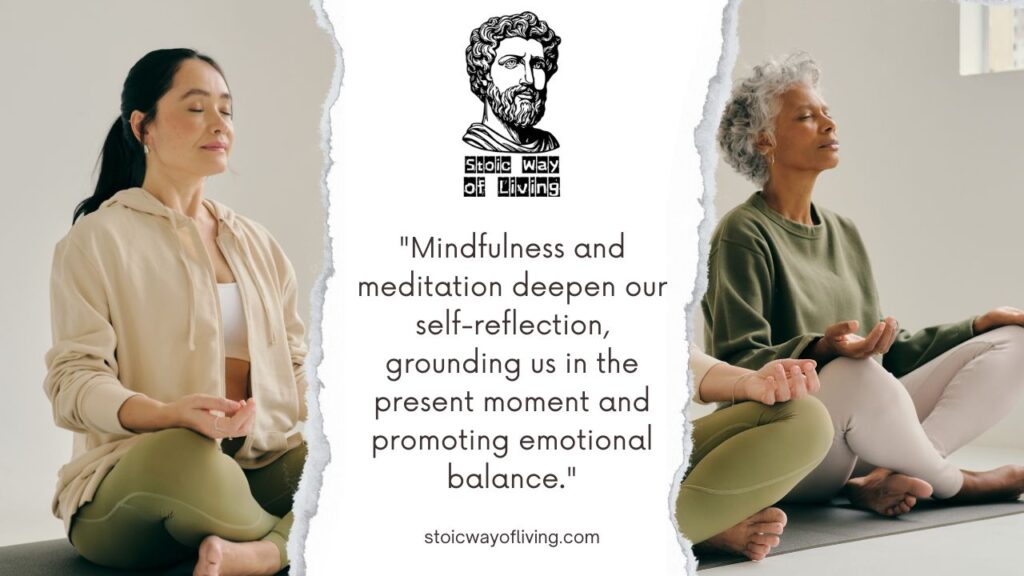
Mindfulness and meditation are complementary practices that enhance self-reflection.
Stoic meditation involves focusing on the present moment and observing one’s thoughts and feelings without judgment.
This practice can be incorporated into daily routines to promote self-awareness and emotional regulation.
Mindfulness practices, like deep breathing and body scans, can help individuals stay grounded and present during self-reflection.
Regular Review and Adjustment
Setting aside time for regular review and adjustment is essential to maximize the benefits of self-reflection.
This involves not only daily reflection but also weekly and monthly reviews.
During these sessions, individuals can assess their progress toward personal goals, evaluate their adherence to core values, and adjust their strategies as necessary.
This systematic approach ensures that self-reflection remains an ongoing, dynamic process supporting personal and professional growth.
By regularly reviewing and adjusting their reflections, individuals can stay on track and make meaningful progress in their journey of self-improvement.
Overcoming Challenges in Self-Reflection
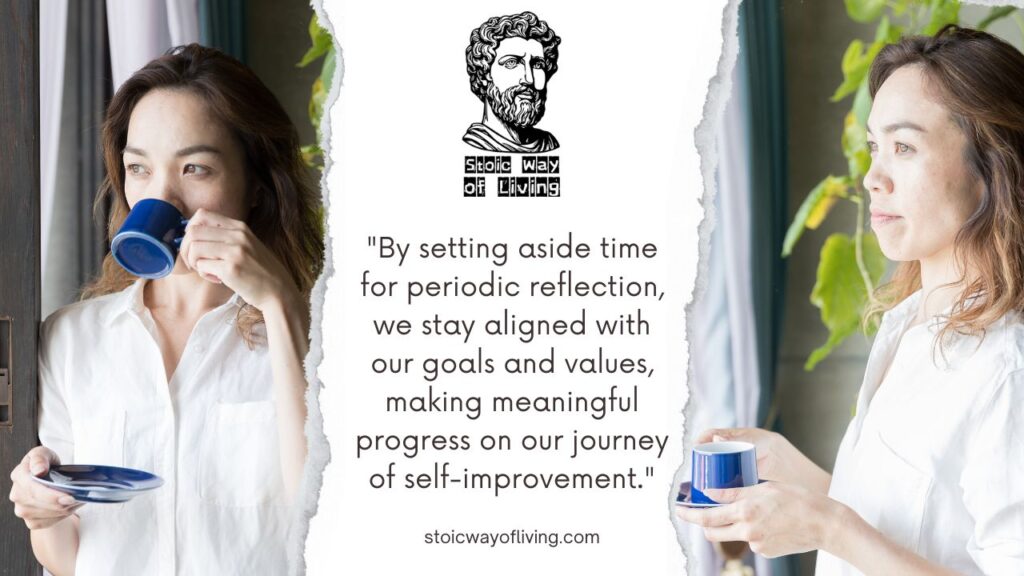
Self-reflection can be challenging, as it often involves confronting uncomfortable truths about oneself.
Common obstacles include bias, regret, and discomfort.
Stoic strategies such as maintaining objectivity and practicing self-compassion can help overcome these challenges.
It’s essential to approach self-reflection with a neutral mindset, focusing on learning and growth rather than self-criticism.
Acknowledging that discomfort is a natural part of the reflective process can encourage persistence.
By embracing these challenges and remaining committed to self-reflection, individuals can achieve more profound insights and significant personal development.
See also: Setting Healthy Boundaries from a Stoic Perspective!
Conclusion
Daily self-reflection, grounded in Stoic principles, offers personal growth and well-being benefits.
Self-reflection becomes a powerful tool for leading a more fulfilling and purposeful life by fostering greater accountability, enhancing emotional resilience, improving decision-making, cultivating virtue, and ensuring alignment with core values.
The practice, as illustrated by the wisdom of Stoic philosophers, helps individuals navigate life’s complexities with clarity and understanding, ultimately achieving a higher state of personal and ethical development.
To further enrich your journey of self-reflection, consider exploring this book, “Daily Reflections.” Check it out now on Amazon to incorporate this valuable resource into your daily routine and continue your journey toward self-awareness and personal growth.


